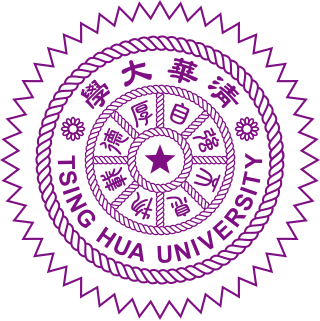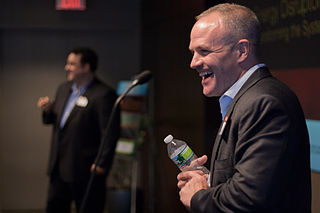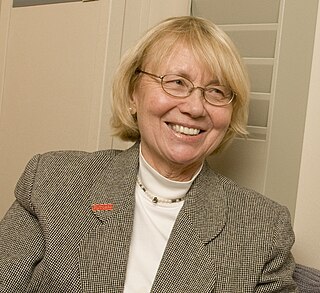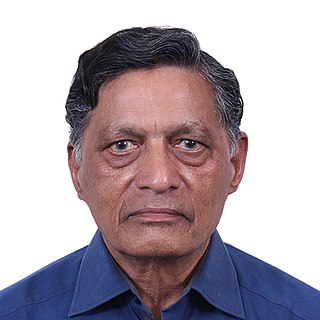
National Tsing Hua University (NTHU) is a public research university in Hsinchu, Taiwan. It was first founded in Beijing. After the Chinese Civil War, president Mei Yiqi, and other major academics fled to Taiwan with the retreating Nationalist government. In 1956, they reinstalled National Tsing Hua University in Taiwan which has since remained independent and distinct from Tsinghua University in Beijing.

The rifamycins are a group of antibiotics that are synthesized either naturally by the bacterium Amycolatopsis rifamycinica or artificially. They are a subclass of the larger family of ansamycins. Rifamycins are particularly effective against mycobacteria, and are therefore used to treat tuberculosis, leprosy, and mycobacterium avium complex (MAC) infections.
Claude H. Nash was CEO of Bloodstone Ventures plc. from 2007 to 2010. From 2004 to 2006 he was vice president, research and development at the University of Maryland Biotechnology Institute. He previously cofounded, and was CEO and chairman of, ViroPharma Incorporated, a pharmaceutical company. Before founding ViroPharma, Nash was vice president of infectious disease and cancer research at the Schering-Plough Research Institute.

Jay D. Keasling is a professor of chemical engineering and bioengineering at the University of California, Berkeley. He is also associate laboratory director for biosciences at the Lawrence Berkeley National Laboratory and chief executive officer of the Joint BioEnergy Institute. He is considered one of the foremost authorities in synthetic biology, especially in the field of metabolic engineering.
Siegfried Scherer is a German biologist, since 1991 Professor of Microbiology at the Technical University of Munich, Weihenstephan since 1991, where he is Managing Director of the Nutrition and Food Research Center ZIEL. Scherer is not a prominent creationist as often purported. He believes that religion and science are two different ways of approaching reality. He is married to anthropologist Sigrid Hartwig-Scherer.

Chia-Chiao Lin was a Chinese-born American applied mathematician and Institute Professor at the Massachusetts Institute of Technology.

Joan Wennstrom Bennett is a fungal geneticist who also is active in issues concerning women in science. Educated at Upsala College and the University of Chicago, she was on the faculty of Tulane University for 35 years. She is a past president of the American Society for Microbiology (1990-1991) and of the Society for Industrial Microbiology and Biotechnology (2001-2002), and past Editor in Chief of Mycologia (2000-2004). She was elected to the National Academy of Sciences in 2005.
Arnold L. Demain was an American microbiologist. During his 60-year career, he gained a reputation in the field of industrial microbiology. He was the Professor of Industrial Microbiology in the Biology Department at MIT and Founder and Head of Department of Fermentation Microbiology at Merck & Co. The August 2010 edition of The Journal of Antibiotics celebrated his scientific career. Demain was described as "one of the world's leading industrial microbiologists" and as "a scientist constantly in the forefront of industrial microbiology and biotechnology." He was "a pioneer in research on the elucidation and regulation of the biosynthetic pathways leading to the penicillins and cephalosporins" and "instrumental in the development of the beta-lactam industry". One feature of Demain's work, according to Microbiology Australia, was his "ability to undertake fundamental research on systems with clear industrial applications, recognising that biodiscovery is the start of the road that includes strain improvement to achieve levels of product synthesis that warrant further investment to take products into the marketplace."

Feng Depei or Te-Pei Feng was a Chinese neuroscientist and physiologist. He is considered one of founders of modern Chinese neuroscience and physiology.

Jens Nielsen is the CEO of BioInnovation Institute, Copenhagen, Denmark, and professor of systems biology at Chalmers University of Technology, Gothenburg, Sweden. He is also an adjunct professor at the Danish Technical University and the University of Copenhagen. Nielsen is the most cited researcher in the field of metabolic engineering, and he is the most cited researcher in Biology and Biochemistry in Sweden and Denmark. He is the only foreign member of all three academies in the US and he is also foreign member of the Chinese Academy of Engineering. He was the founding president of the International Metabolic Engineering Society. He has additionally founded several biotech companies.
Edward Galas was a Polish biochemist, Rector of the Lodz University of Technology in 1975–81.

Oscar Paul Kuipers is a Dutch professor of molecular genetics at the University of Groningen. His areas of expertise include microbiology, biochemistry, molecular and cell biology, and biotechnology.
Brahm Shanker Srivastava is an Indian microbiologist, inventor and a former deputy director and head of Microbiology division of the Central Drug Research Institute. He is the founder of Biotech Research, a non-profit non governmental institution promoting research in the field of biotechnology and is a director of Nextec Lifesciences Private Limited, a start up involved in biomedical products and research applications. He is known for his researches on microbial genetics and is an elected fellow of the National Academy of Sciences, India.

The Geisenheim Yeast Breeding Center was founded in 1894 and is located in the town of Geisenheim, in Germany's Rheingau.

Rup Lal is an Indian molecular biologist known for his work in molecular biology, genomics, metagenomics and taxonomy of microbial diversity inhabiting extreme niches. His research has led to the development of novel analogue of rifamycin, identification and functional characterization of microbial communities at Manikaran hotsprings atop the Himalyan Ranges in Himachal Pradesh and deciphering the role of microbes in degradation of Hexacholorocyclohexane (HCH) at a polluted dumpsite located at Ummari village, Lucknow, India. He has over 45 years of strong and longstanding experience in administration, teaching and research in various capacities at University of Delhi, India. He was ASM Ambassador for India (2012-2015), presently the ISME and FEMS Ambassador to India and Ambassador to International Microbial Literacy Initiative-South Asia Centre. He was a visiting scientist at the University of Cambridge, University of Kaiserslautern, Oregon State University, EPFL, University of Lausanne, ETH-EAWAG, Zurich, CSIRO- Canberra (Australia) and Helmholtz Centre for Environmental Research, Leipzig. He is recipient of several prestigious fellowships: Alexander von Humboldt Fellowship, DBT- Overseas Fellowship, Indo-US-ASM Professorship in Microbiology, Australian Government Endeavour Executive Fellowship (2018-2019), ASM Moselio Schaechter Distinguished Service Award, Prof. S.R. Vyas Memorial Award, Prof. BN Johri Award, Lifetime Achievement Award from AMI(Association of Microbiologists of India), and Best ISME Ambassador-2022, Editor-in-Chief Indian Journal of Microbiology (2006-2013) and editorial board member- mSystems, ISME- Communication, Environmental-Microbiology/Reports, BMC-Biotechnology/Biochemistry, Microbial-Biotechnology, Indian Journal of Microbiology.
Armen Trchounian was an Armenian biophysicist. D.Sc. in Biological sciences (1990) and professor (2002), Corresponding Member of NAS RA (2006) and Head of the Department of Biochemistry, Microbiology, and Biotechnology of Yerevan State University (2016–2020).

Geoffrey Michael Gadd is a British-Irish microbiologist and mycologist specializing in geomicrobiology, geomycology, and bioremediation. He is currently a professor at the University of Dundee, holding the Boyd Baxter Chair of Biology, and is head of the Geomicrobiology Group.
Willis Avery “Woody” Wood was an American microbiology professor, an inventor, and an entrepreneur. He was the president of the American Society for Microbiology in 1980. Wood was known for his research on bacterial enzymes and the molecular biology of sugars and amino acids.
Ramesh Chandra Ray is an agriculture and food microbiologist, author, and editor. He is the former Principal Scientist (Microbiology), and Head of the Regional Centre at Indian Council of Agricultural Research ICAR - Central Tuber Crops Research Institute in Bhubaneswar, India.
Eric A. Johnson is a microbiologist and an academic. He is a retired Professor of Bacteriology from the University of Wisconsin-Madison, serving from 1985 to 2020.











